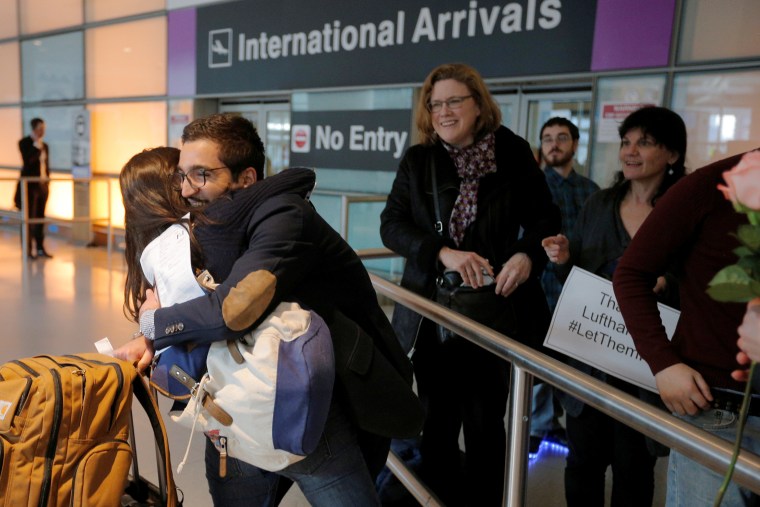Hours before a court battle between federal and state lawyers over Donald Trump's travel and refugee ban, administration officials offered a possible compromise that would allow some affected travelers into the country while keeping others out.
The Justice Department will face off with opponents in a federal appeals court Tuesday over the fate of the executive order on immigration, Trump's most controversial act since taking office.
The 9th U.S. Circuit Court of Appeals in San Francisco will hear arguments over whether to restore the measure, which was suspended by a district judge in Washington state. The court, which has already rejected one government request to reinstate the order, scheduled oral arguments by telephone before a three-judge panel for 6 p.m. ET Tuesday.
Trump's order barred travelers carrying visas from Sudan, Libya, Somalia, Syria, Iran, Iraq and Yemen from entering the United States for 90 days out of terrorism concerns. In addition, refugees were barred for 120 days, and all Syrian refugees were barred indefinitely.
In an 11-page reply to arguments filed by opponents, the Justice Department restated earlier arguments that the president has "unreviewable authority" to suspend entry of "any class of aliens to protect the national interest" and that states (in this case, Washington and Minnesota) can't challenge federal denial of entry by third-party aliens.
Washington Attorney General Bob Ferguson has rebutted that contention, saying on NBC's "TODAY" that "we have a checks-and-balances system in our country, and the president doesn't have totally unfettered discretion."
In its new filing, the federal government suggested a possible middle ground, giving the court a way to keep some of the executive order intact even if it sides mostly with Washington and Minnesota.
Justice Department lawyers argued that the lower-court ruling focused on protecting lawful permanent U.S. residents and other nationals from the seven restricted countries "who were previously admitted to the United States and are either temporarily abroad or are here now and wish to travel outside this country — not aliens who are attempting to enter the country for the first time."
Trump's order didn't apply to lawful permanent residents, so, the government said, the stay should have been much narrower, covering, at most, "previously admitted aliens who are temporarily abroad now or who wish to travel and return to the United States in the future."
Almost 100 big tech companies asked the appeals court not to restore Trump's order, arguing that the restriction "hinders the ability of American companies to attract great talent; increases costs imposed on business; makes it more difficult for American firms to compete in the international marketplace; and gives global enterprises a new, significant incentive to build operations — and hire new employees — outside the United States."
Numerous other third-party filings — called amicus curiae briefs — were entered by pro-immigration and civil liberties groups opposing the president's order.
And several former top federal officials — including former Secretaries of State John Kerry and Madeleine Albright, former Defense Secretary Leon Panetta and Susan Rice, President Barack Obama's national security adviser — filed their own statement of support for Washington and Minnesota.
The former officials said Trump's order "ultimately undermines the national security of the United States, rather than making us safer."
"There is no national security purpose for a total bar on entry for aliens from the seven named countries," they wrote. "In our professional opinion, the Order was ill-conceived, poorly implemented and ill-explained."

